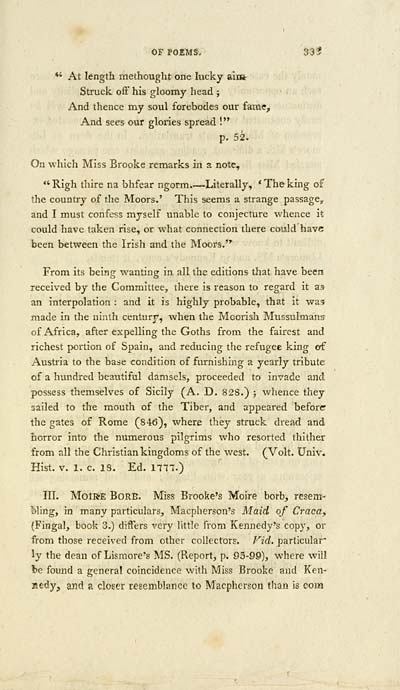Ossian Collection > Report of the Committee of the Highland Society of Scotland, appointed to inquire into the nature and authenticity of the poems of Ossian
(511)
Download files
Complete book:
Individual page:
Thumbnail gallery: Grid view | List view

OF POEMS, 33 1
44 At length methought one lucky ain*
Struck off his gloomy head ;
And thence my soul forebodes our fame,
And sees our glories spread !"
p. 52.
On which Miss Brooke remarks in a note,
'* Righ thire na bhfear ngorm. — Literally, ' The king of
the country of the Moors.' This seems a strange passage,
and I must confess myself unable to conjecture whence it
could have taken rise, or what connection there could have
been between the Irish and the Moors."
From its being wanting in all the editions that have been
received by the Committee, there is reason to regard it as
an interpolation : and it is highly probable, that it was
made in the ninth century, when the Moorish Mussulmans
of Africa, after expelling the Goths from the fairest and
richest portion of Spain, and reducing the refugee king of
Austria to the base condition of furnishing a yearly tribute
of a hundred beautiful damsels, proceeded to invade and
possess themselves of Sicily (A. D. 828.) 5 whence they
sailed to the mouth of the Tiber, and appeared before*
the gates of Rome (846), where they struck dread and
horror into the numerous pilgrims who resorted thither
from all the Christian kingdoms of the west. (Volt. Univ.
Hist. v. 1. c. 18. Ed. 1777.)
III. MoiRE Borb. Miss Brooke's Moire borb, resem-
bling, in many particulars, Macpherson's Maid of Craca,
(Fingal, book 3.) differs very little from Kennedy's copy, or
from those received from other collectors. Fid. particular-
ly the dean of Lismore's MS. (Report, p. 95-99), where will
be found a general coincidence with Miss Brooke and Ken-
sedy, and a closer resemblance to Macpherson than is com
44 At length methought one lucky ain*
Struck off his gloomy head ;
And thence my soul forebodes our fame,
And sees our glories spread !"
p. 52.
On which Miss Brooke remarks in a note,
'* Righ thire na bhfear ngorm. — Literally, ' The king of
the country of the Moors.' This seems a strange passage,
and I must confess myself unable to conjecture whence it
could have taken rise, or what connection there could have
been between the Irish and the Moors."
From its being wanting in all the editions that have been
received by the Committee, there is reason to regard it as
an interpolation : and it is highly probable, that it was
made in the ninth century, when the Moorish Mussulmans
of Africa, after expelling the Goths from the fairest and
richest portion of Spain, and reducing the refugee king of
Austria to the base condition of furnishing a yearly tribute
of a hundred beautiful damsels, proceeded to invade and
possess themselves of Sicily (A. D. 828.) 5 whence they
sailed to the mouth of the Tiber, and appeared before*
the gates of Rome (846), where they struck dread and
horror into the numerous pilgrims who resorted thither
from all the Christian kingdoms of the west. (Volt. Univ.
Hist. v. 1. c. 18. Ed. 1777.)
III. MoiRE Borb. Miss Brooke's Moire borb, resem-
bling, in many particulars, Macpherson's Maid of Craca,
(Fingal, book 3.) differs very little from Kennedy's copy, or
from those received from other collectors. Fid. particular-
ly the dean of Lismore's MS. (Report, p. 95-99), where will
be found a general coincidence with Miss Brooke and Ken-
sedy, and a closer resemblance to Macpherson than is com
Set display mode to: Large image | Transcription
Images and transcriptions on this page, including medium image downloads, may be used under the Creative Commons Attribution 4.0 International Licence unless otherwise stated. ![]()
| Permanent URL | https://digital.nls.uk/81754870 |
|---|
| Description | Selected books from the Ossian Collection of 327 volumes, originally assembled by J. Norman Methven of Perth. Different editions and translations of James MacPherson's epic poem 'Ossian', some with a map of the 'Kingdom of Connor'. Also secondary material relating to Ossianic poetry and the Ossian controversy. |
|---|
| Description | Selected items from five 'Special and Named Printed Collections'. Includes books in Gaelic and other Celtic languages, works about the Gaels, their languages, literature, culture and history. |
|---|

